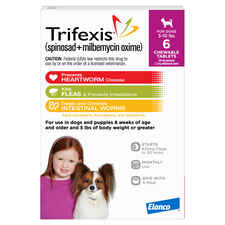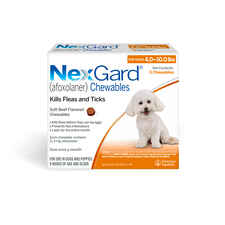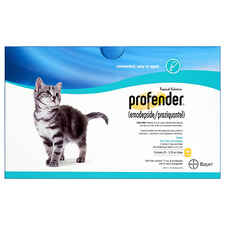5 Pet Health Problems Fleas Can Cause
Doctor of Veterinary Medicine

While efforts are made to answer all questions as quickly as possible, if an immediate answer is required or if your pet is in need of urgent or emergency care, contact your pet's veterinarian immediately.
Doctor of Veterinary Medicine

You will receive an answer from Dr. Lindsay and our vet/tech team as soon as possible, usually the same day.
All answers are provided for informational or educational purposes only, and are intended to be a supplement to, and not a substitute for, the expertise and professional judgment of your pet's veterinarian.
It may be necessary to consult your pet's veterinarian regarding the applicability of any opinions or recommendations with respect to your pet's symptoms or medical condition.
CloseDoctor of Veterinary Medicine

An error has occurred, please reload the page and try again.
CloseWhile efforts are made to answer all questions as quickly as possible, if an immediate answer is required or if your pet is in need of urgent or emergency care, contact your pet's veterinarian immediately.
There is no answer related to your question

Fleas are a pretty common problem for both cats and dogs. When the weather starts warming up, fleas can run rampant in your yard and bite your pet.
As if itchy flea bites weren't annoying enough, fleas can cause many other issues for your pet.
Check out these 5 health problems that yucky fleas can cause
1. Flea allergy dermatitis (skin allergies)
Most flea bites cause a little bump, but if your pet is allergic to the saliva of a flea, your pet will constantly scratch and cause swelling and welts on the skin. One of the best ways to stop your pet from being miserable with flea bites is to use a monthly flea preventative.
2. Hot spots
As if extremely itchy skin isn't a problem enough, constant scratching or chewing of the skin can create hot spots on your pet's skin. Cleaning your pet with a natural anti-bacterial shampoo with tea tree oil such as Be Soothed Shampoo (for dogs only) will help relieve pain and itching. To reduce itching and soothe skin, try using a hydrocortisone spray such as Be Soothed Tea Tree Oil Spray or a hydrocortisone spray.
3. Tapeworms
If your pet accidentally swallows a flea from licking or chewing his or her skin, your pet may develop a tapeworm. Tapeworms are parasites that live in your pet's intestinal tract, and rob him or her of vital nutrients. Watch for little tapeworm segments that look like grains of sand. Don't wait to treat pets infected with a tapeworm; try using an over-the-counter medication like HomeoPet Wrm Clear or Panacur C Canine Dewormer to get rid of tapeworms.
4. Anemia
Fleas are blood-sucking parasites, which means your pet can become anemic from biting fleas. Symptoms like pale gums, lethargy and/or low body temp could be a sign on anemia. Anemia is especially concerning for puppies or sickly dogs, and if it's not caught soon enough, it can lead to other medical complications and even death. In order to help your pet with anemia, you must stop fleas from biting your pet immediately. Also, make sure your pet is getting the right nutrients by giving him or her daily vitamins.
5. Bartonella infection
A Bartonella infection can affect dogs, cats and even humans (usually called Cat Scratch Fever). Dogs and cats that become infected with Bartonella, are bitten by a flea that carries the parasite. Symptoms of a Bartonella infection include fever, vomiting, diarrhea, seizures and swelling of the lymph nodes. Therefore, you must stop fleas from biting your pet. Depending on where you live a Bartonella infection may be less common. However, Bartonella is very dangerous and you should take your pet to a vet at the first signs of the infection.
If you have seen a flea on your pet, it's a good bet you have fleas in your home. Check out our How to Get Rid Rid of Fleas in your Home article for more information.
 Swipe
Swipe

































